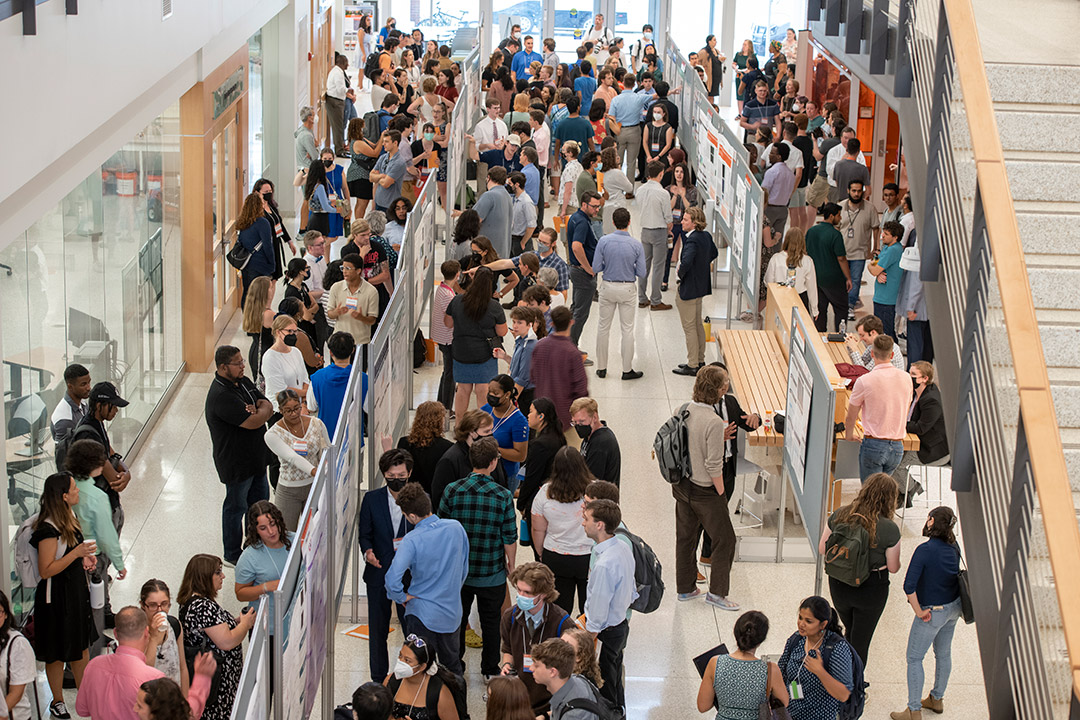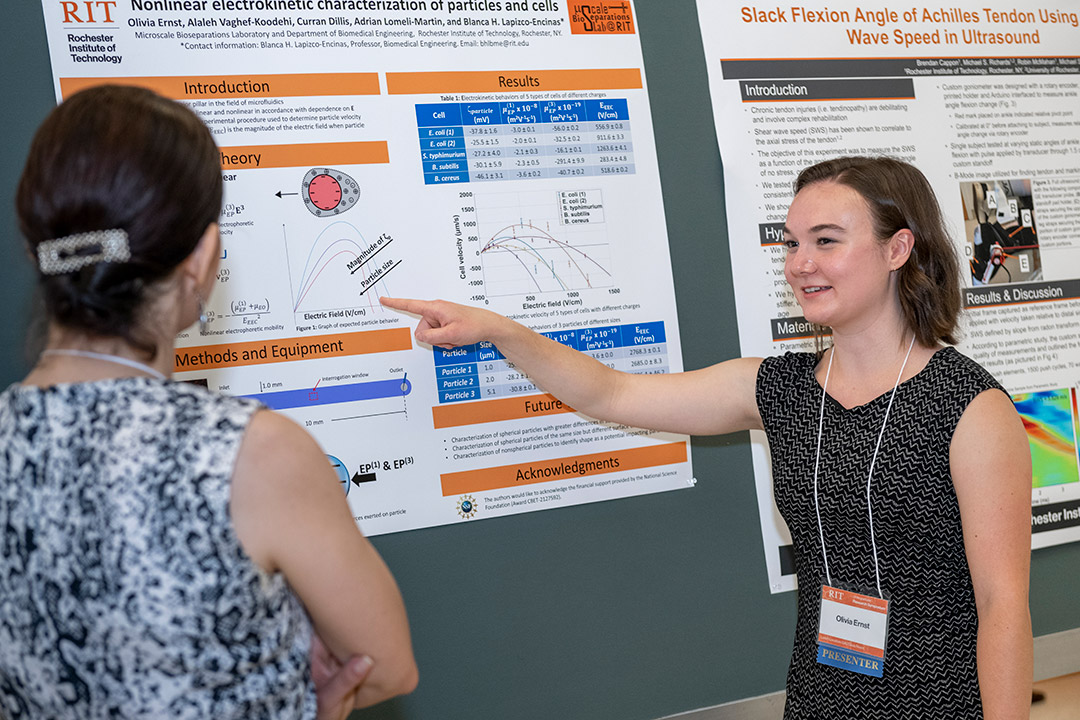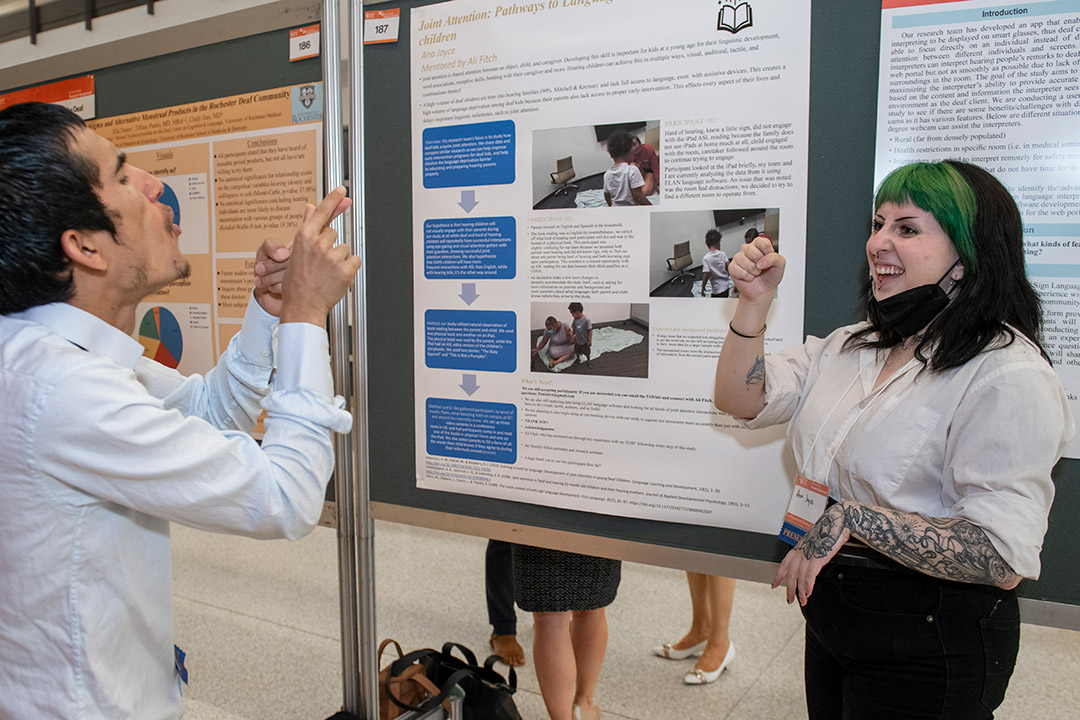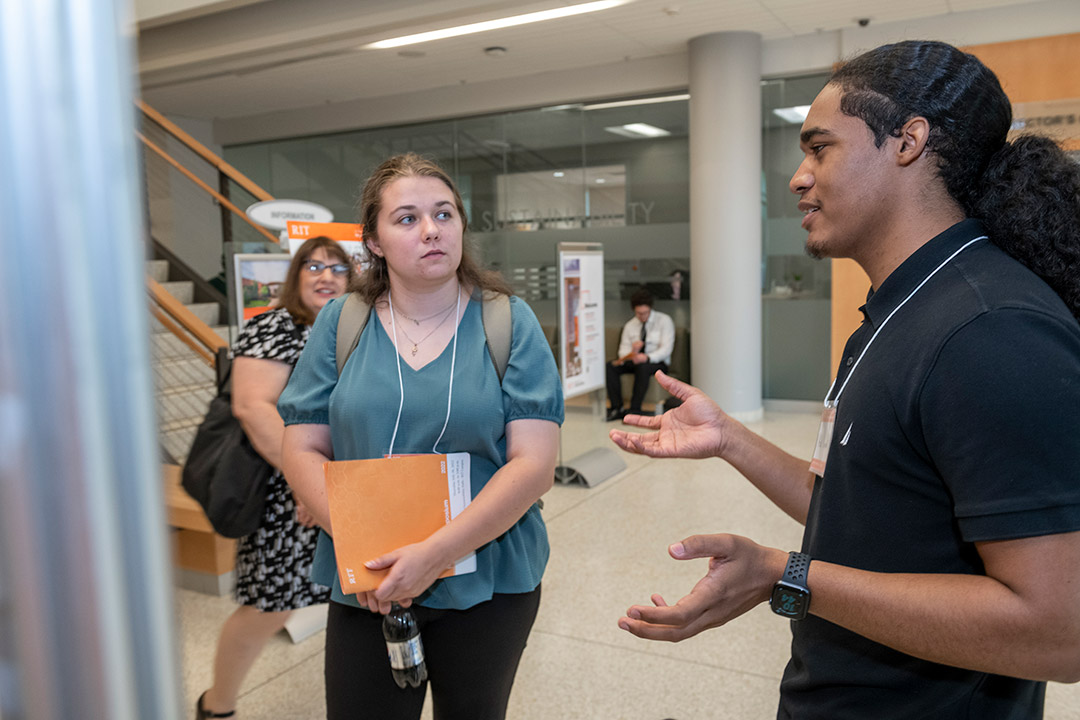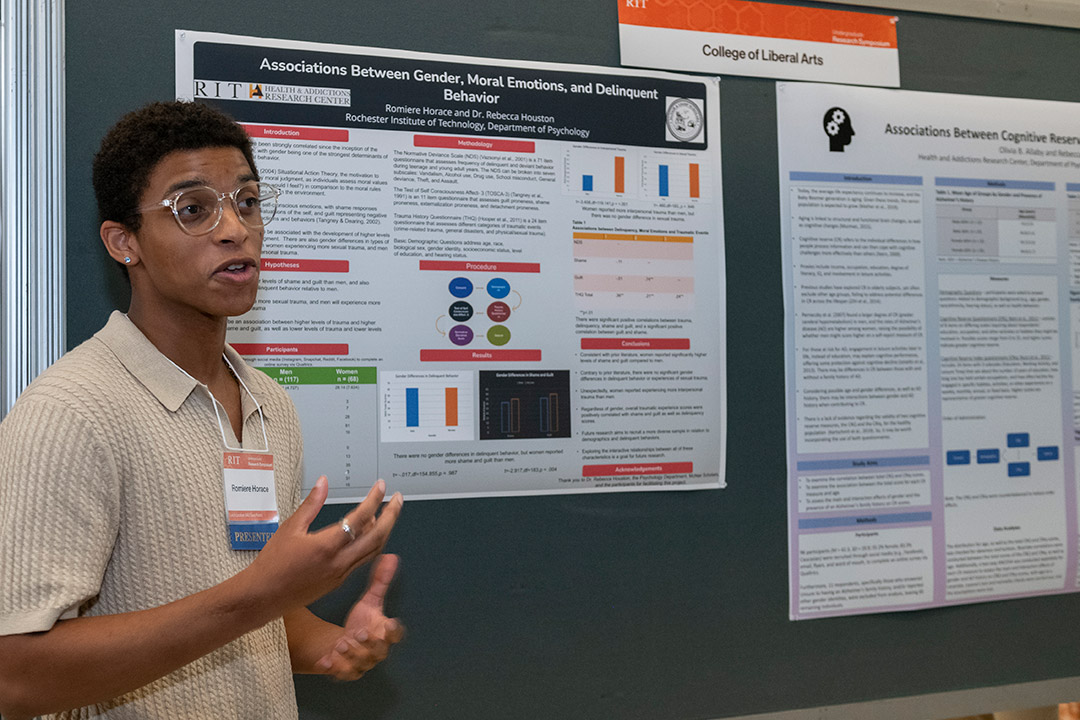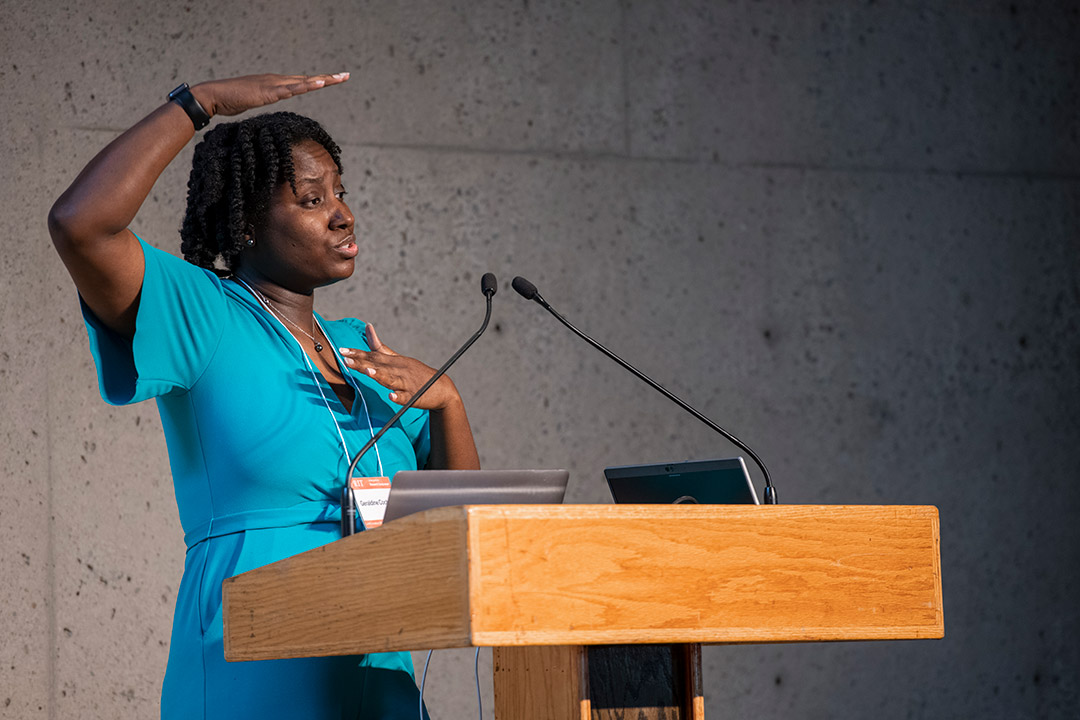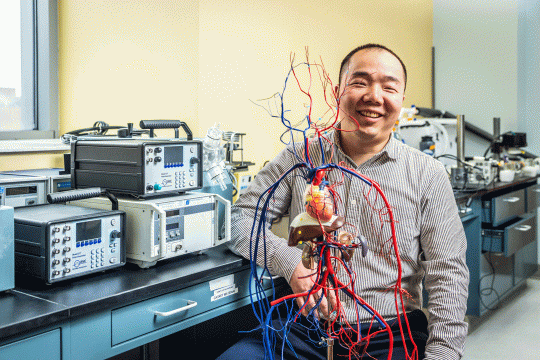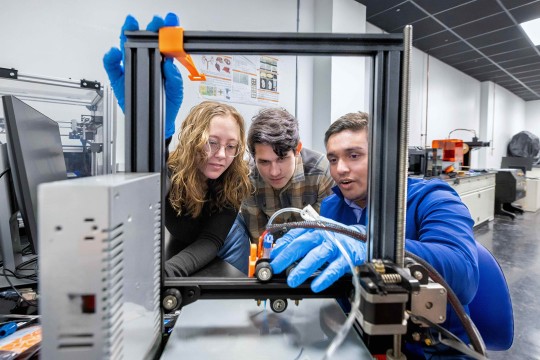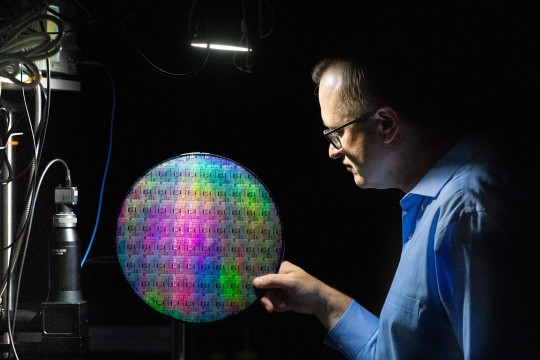RIT undergraduates reveal research projects at annual summer symposium
High-level, student-focused research touches plethora of topics
Elizabeth Lamark
More than 200 student research projects were on display at the 31st annual Undergraduate Research Symposium on July 28.
RIT biomedical engineering student Olivia Ernst hopes her cutting-edge research in particle and cell separation will one day help scientists and physicians identify diseases and create treatment plans in a matter of minutes.
Elizabeth Lamark
Biomedical engineering student Olivia Ernst, right, will be presenting her work on particle and cell separation at a conference this fall and will use this experience as a jumping off point for her plans to work in the pharmaceutical industry.
Her project, “Nonlinear electrokinetic characterization of particles and cells,” was among more than 200 innovative student projects at the 31st annual Undergraduate Research Symposium on July 28. The event, which took place in Sustainability Institute Hall and the Student Alumni Union, featured some of the best in undergraduate research ideas and solutions. Research proposals were featured in a series of oral and poster presentations throughout the day. Students who were unable to present their research at the in-person event can showcase their research at the International Day Online Gallery on Aug. 3.
Structured as a professional conference, the symposium, which is sponsored by RIT’s Office of the Vice President for Research, showcased research from areas including fine arts; biomedical and life sciences; astronomy; optics, photonics and imaging; energy and sustainability; business; chemistry, materials sciences and engineering; computer modeling, design and simulation; ecology; and social sciences, among others.
Blanca Lapizco-Encinas, a professor in the Department of Biomedical Engineering, served as an advisor for Ernst’s project. She is always amazed at the growth of her students as they work through the research process.
“With the proper guidance and encouragement, students can do magnificent things,” she said. “They can lead their own projects and work on publications in which they are the primary authors. These undergraduate students are junior researchers. They are not there to do the dishes in the lab. They are responsible for their projects, including conducting their own experiments and analyzing and writing their results. They are full-fledged investigators.”
Elizabeth Lamark
RIT student Ana Joyce is studying how deaf and hard-of-hearing children develop language and word association using joint attention.
Ana Joyce, a fourth-year studio painting major in the School of Individualized Study, is combining a passion for studio art with providing accessibility services for deaf and hard-of-hearing children. Joyce’s research involves studying how deaf and hard-of-hearing children develop language and word association using joint attention.
“I’ve been painting my whole life and I’ve used it as a healthy coping mechanism since I was young,” said Joyce, who is from Colorado Springs, Colo., and whose plan is to educate through art therapy. “I decided early on what I wanted to do based on my own personal experiences. I was consistent with painting and art and I want to be able to give that to other deaf kids. They can have access to language and they can have access to art, while creating the life that they want.”
Elizabeth Lamark
Keith Grant, right, explains his research on DNA sequencing of blue iguanas in Grand Cayman Island. Grant’s work will influence how scientists use DNA sequencing to identify genetic diversity in animals and affect how animals survive against disease or invasive species.
Wildlife conservation excites Keith Grant, a third-year biology student from New York, N.Y., whose research studies sequencing DNA of the blue iguanas of Grand Cayman Island. But Grant’s research will eventually extend beyond the scaly reptiles. It will impact how scientists use DNA sequencing to identify genetic diversity in animals and affect how animals survive against disease or invasive species, for example. Grant hopes for a career as a wildlife veterinarian at the Bronx Zoo, and his hands-on research could make that a reality.
“Unfortunately, some iguanas die in recovery programs that have been set up in the Cayman Islands. But, as a result, many are sent to various locations for research, and I’ve been able to study deceased iguanas right here in the College of Science building.”
Elizabeth Lamark
Third-year student Romiere Horace is working to determine the factors that impact a person’s ability to commit objectionable offenses.
McNair Scholar Romiere Horace is working to determine the factors that impact a person’s ability to commit objectionable offenses.
“Associations between gender, moral emotions, and delinquent behavior” was presented by the third-year psychology and criminal justice double major who studied a sample of male and female respondents in an attempt to understand the motivation to offend. Horace, who is from Summit, N.J., believes that the motivation is guided largely by a person’s moral judgements.
“My end goal, aside from a future in forensic psychology studying psychological disorders and delinquent behaviors, is to determine where it all starts. Through clinical assessments, it’s important for me to not only learn about how someone was raised and what their relationships are with other people, but also their moral emotions, which are social constructs.”
Horace is also proud that he was able to power through the more difficult parts of his research.
“This has been such a great experience and, even though it can be difficult at certain points and you don’t always get the results you want, just being able to have this research as my own is great. I love it, and I will continue this in the fall working with other professors. I feel like I’m really part of the team.”
Elizabeth Lamark
Geraldine Cochran, associate professor of Professional Practice in the School of Arts and Sciences and the Department of Physics and Astronomy at Rutgers University, was the symposium’s keynote speaker and discussed national efforts to address barriers and inequities in STEM education.
This year’s keynote speaker was Geraldine Cochran, associate professor of Professional Practice in the School of Arts and Sciences and the Department of Physics and Astronomy at Rutgers University, who discussed national efforts to address barriers and inequities in STEM education, and how these impact students’ educational experiences. Cochran also stressed the importance of keeping in touch with faculty and classmates as a way to widen the network for personal and professional support as students continue careers in companies or academia.
Ernst, who is from Alexandria, Va., will be presenting her work at a conference this fall in Cincinnati and will use this experience as a jumping off point for her plans to work in the pharmaceutical industry.
“I’ve learned so much from my advisor and the Ph.D. students,” she said. “I’ve wanted to do research since the beginning of high school, so having the opportunity is fulfilling a dream for me. Being able to be so hands on…I feel like I’m really making a difference.”



